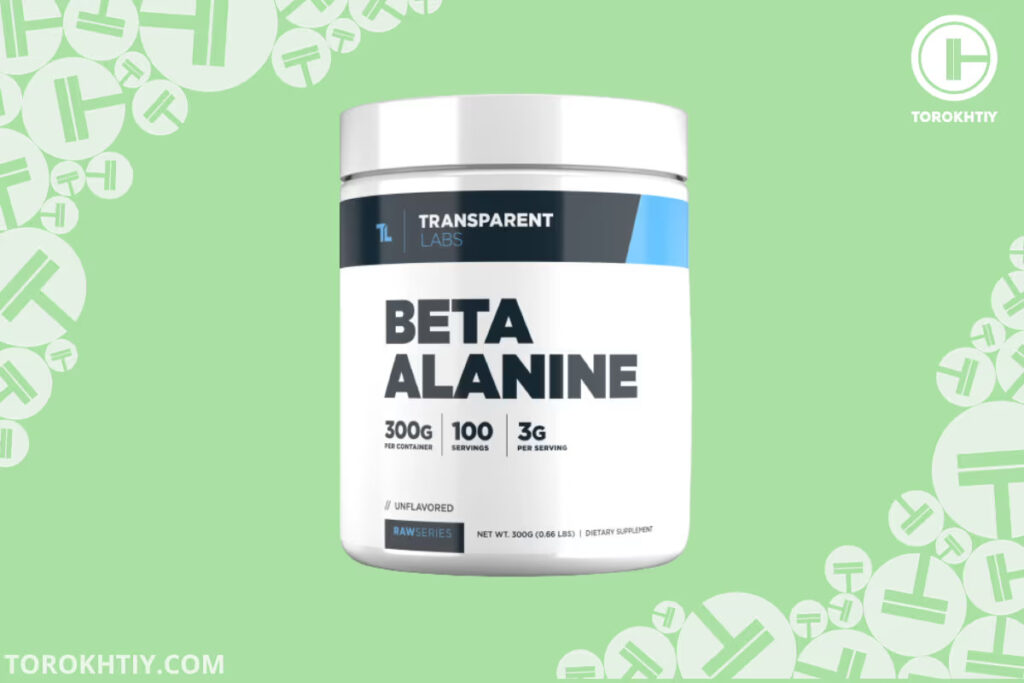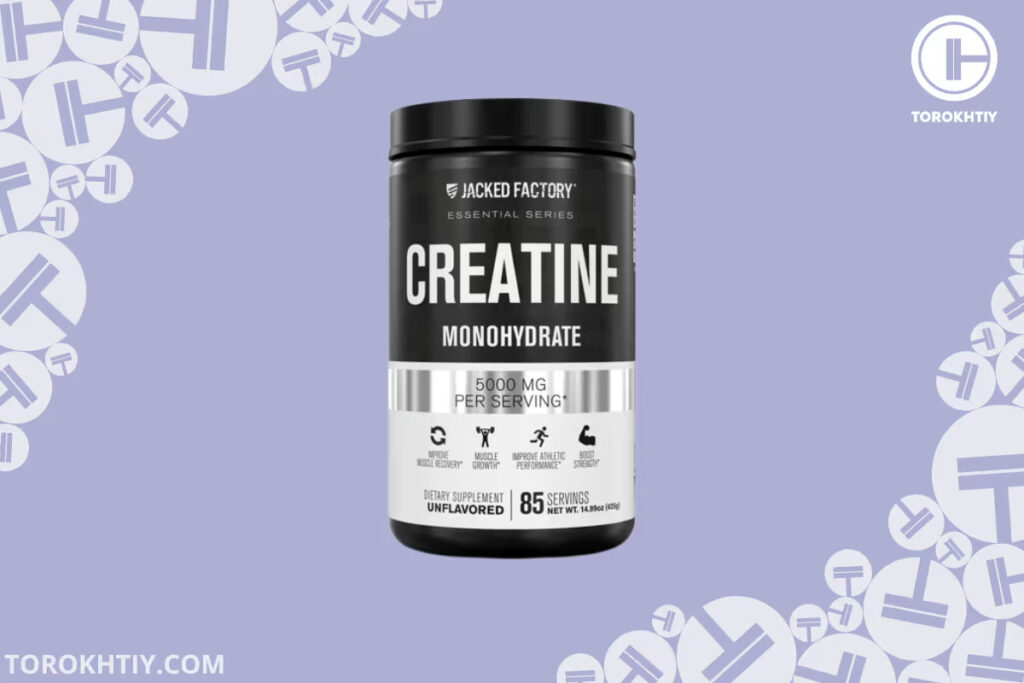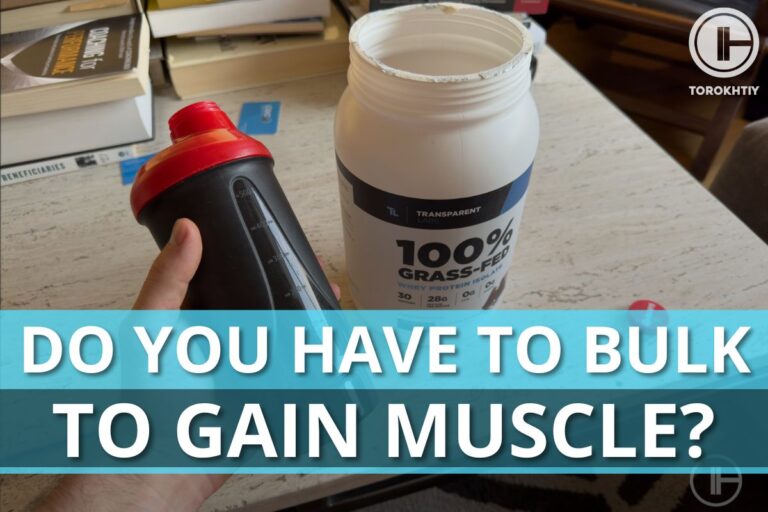Beta Alanine vs Creatine: Which Is More Effective?
Whether you’re going for an explosive gym session or a long run, the right supplement can make a world of difference. When looking at beta alanine vs creatine, you need to know what they are, their differences and how they can enhance your athletic performance in certain ways.
The difference between beta alanine vs creatine is mainly on how they affect your athletic performance. Creatine improves the strength and the explosive power during short burst sprints and heavy workouts. Beta alanine is ideal for longer forms of physical performances as it enhances muscular endurance and reduces muscle fatigue.
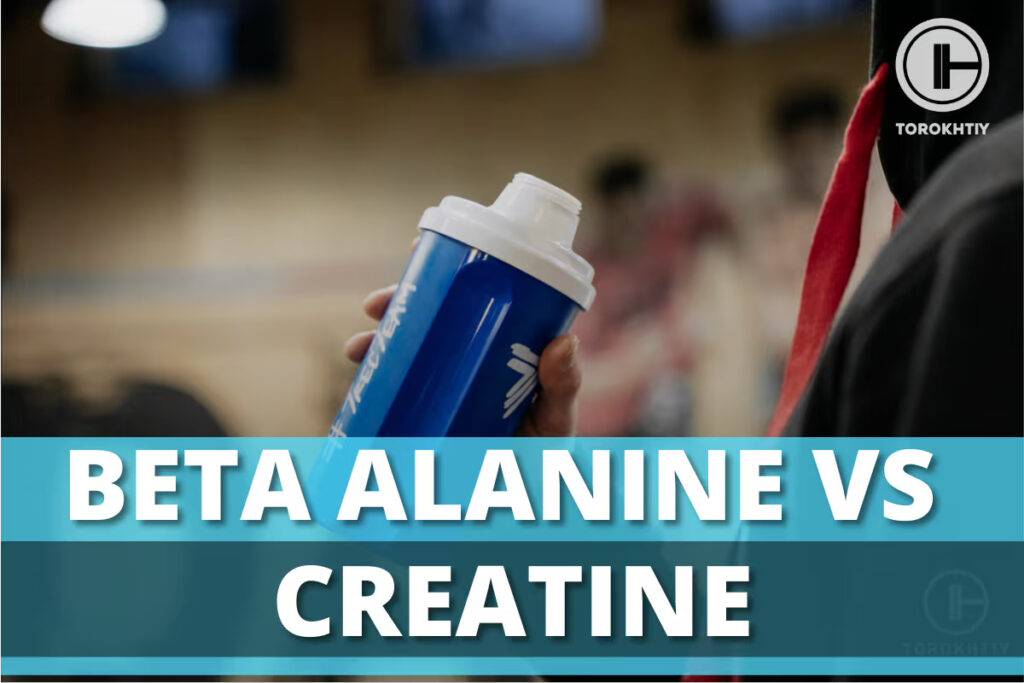
What Is Beta Alanine?
Beta-alanine is an amino acid that helps to increase muscle carnosine levels in our body. The muscle protein carnosine works to prevent acid accumulation in muscles, which occurs during intense exercise. This buffering action helps delay fatigue and improve athletic performance.
Carnosine comprises two amino acids, beta-alanine, and histidine. This is why beta-alanine supplementation can elevate muscle carnosine levels.
Even though carnosine naturally occurs in red meat, chicken, and fish, for athletes who wish to perform at their peak, dietary intake alone may not provide sufficient levels for enhanced performance benefits. This makes supplementation slightly beneficial.
These supplements are available as powder or tablet/capsule. Many go for slow-release capsules to enhance retention and reduce tingling sensations that sometimes occur after ingestion.
Beta-alanine is particularly beneficial for sports and activities involving short and sustained or repeated high-intensity activity, (e.g., rowing, track cycling, swimming, middle-distance running).
Athletes can also take beta-alanine in the weeks leading up to intense training or competitions. It can also be used when high-intensity efforts follow endurance exercises or as an alternative to sodium bicarbonate (if gastrointestinal upset is a concern).
It’s important to note that the acute effect of beta alanine is too small to feel any noticeable difference from just a single dose.
Therefore in order to truly benefit from beta alanine supplementation, it needs to be taken consistently (3g per day) for a few weeks. This way it builds up in the body, allowing for that fatigue reducing effect.
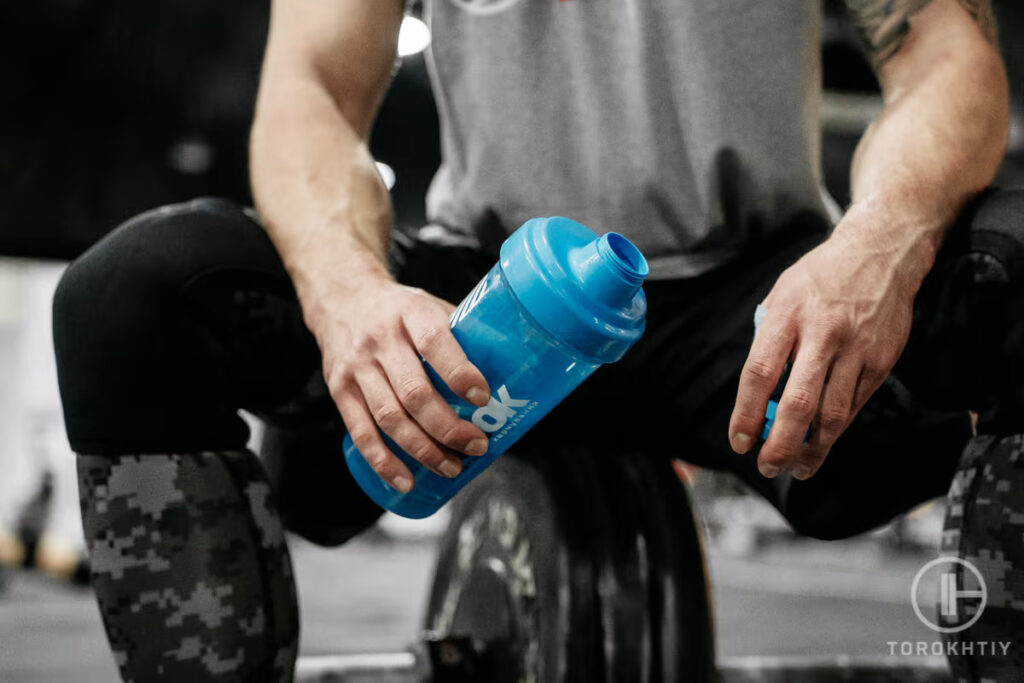
What Is Creatine?
Creatine is a naturally occurring compound. It is found in small amounts in some foods and synthesized by the body, primarily in the liver and kidneys. It helps supply energy to cells, particularly during high-intensity, short-duration activities.
Creatine is one of the most well-researched and widely used dietary supplements in the world. Its benefits include enhanced athletic performance, muscle mass, muscle recovery, and muscle endurance.
Creatine also offers potential neurological and cognitive benefits, with studies suggesting neuroprotective properties that could aid cognitive function, especially after a traumatic brain injury and neurodegenerative diseases. Creatine supplementation also shows promise in various medical conditions, including muscle-wasting disorders like muscular dystrophy,
It is generally well-tolerated and safe when used within recommended dosages, with minimal side effects, typically mild gastrointestinal discomfort or water retention (however water retention is actually a good thing in that case).
Moreover, creatine is easily accessible over-the-counter as a dietary supplement and is relatively affordable compared to many other supplements.
Beta Alanine Vs Creatine
| Factor | Beta-Alanine | Creatine |
|---|---|---|
| Chemical Composition | A non-essential amino acid | A naturally occurring compound |
| Main Function | Increases muscle carnosine levels, which helps buffer acid buildup during intense exercise, delaying fatigue | Increases the body’s phosphocreatine levels, providing quick energy for high-intensity, short-duration activities |
| Performance Benefits | Enhances endurance in activities with repetitive high-intensity efforts (e.g., sprinting, weightlifting) | Improves performance in short, intense activities (e.g., weightlifting, sprinting) |
| Muscle Size | Can have an indirect effect on muscle growth due to potentially increased training volume/work capacity. | Can lead to increased muscle mass, primarily through water retention and potential improvements in muscle protein synthesis |
| Muscle Recovery | May reduce muscle damage and inflammation, potentially leading to faster recovery | May reduce muscle damage and improve recovery |
| Cognitive Benefits | Limited evidence of cognitive benefits | Some research suggests potential cognitive benefits, particularly in tasks requiring short-term memory and quick thinking |
| Safety and Tolerance | Generally well-tolerated; tingling sensations (paresthesia) are a common but harmless side effect | Generally well-tolerated; minor gastrointestinal discomfort is an occasional side effect. |
| Targeted Activities | Best suited for sports involving sustained high-intensity efforts (e.g., rowing, middle-distance running) | Most effective in short, explosive activities (e.g., weightlifting, sprinting) |
Beta Alanine Vs Creatine: Summary
Beta-Alanine primarily benefits athletes in sports with repetitive high-intensity efforts. It is primarily a fatigue reducer that you can benefit from with long term usage. On the other hand, creatine is best suited for short bursts of intense activity.
It’s the perfect fuel for high intensity workouts. The choice depends on individual fitness goals and the nature of athletic pursuits.
For instance, creatine is better suited for increasing muscle size. Some athletes, especially serious athletes, even choose to supplement creatine with beta alanine to maximize their performance benefits.
You may use both supplements, that is why they are commonly used together in many pre-workout formulations.
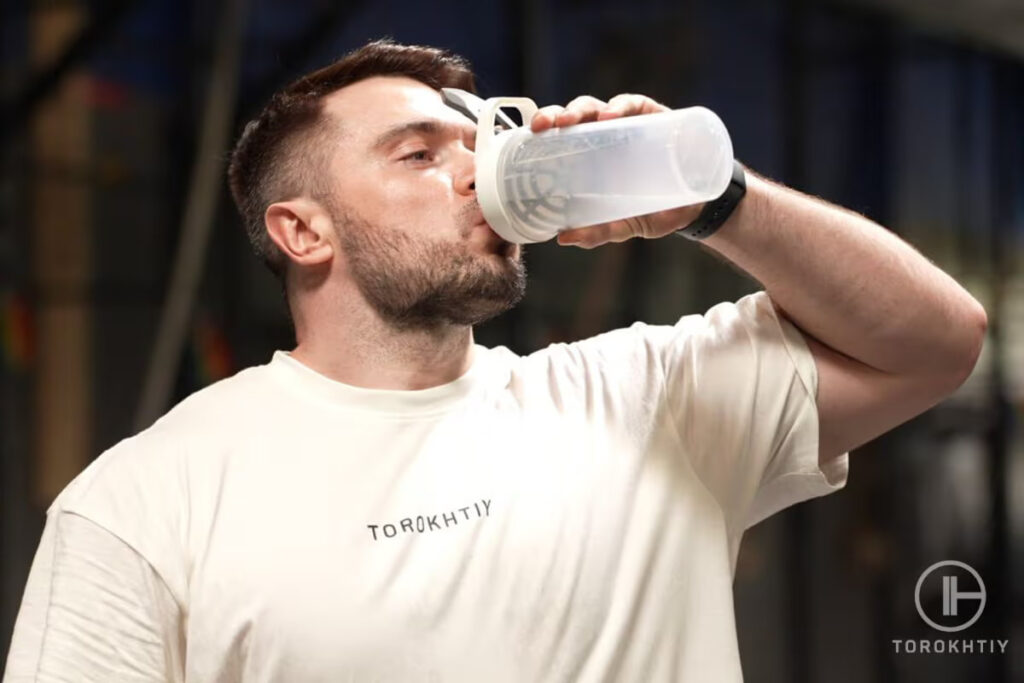
1. Pros & Cons Of Beta Alanine
Positives:
Could be better:
2. Pros & Cons Of Creatine
Positives:
Could be better:
Beta Alanine Vs Creatine: When To Use Each
1. Beta Alanine
Beta-alanine is primarily used to enhance endurance and reduce muscle fatigue during high-intensity, short-duration activities like weightlifting, sprinting, and HIIT by increasing muscle carnosine levels to buffer acid build-up.
You can take beta alanine preferably with meals, however timing does not matter. If you like it, you can take beta alanine as a pre-workout, 30-60 minutes before exercises lasting 1-4 minutes, including sprinting, weightlifting, interval training, and sports with short bursts of intense effort.
If you get and don’t like the tingling effect, it’s better to split the doses across the day.
2. Creatine
Creatine, a naturally occurring compound, increases phosphocreatine stores to enhance short-term, high-intensity exercise performance.
It’s suitable for high intensity activities lasting less than 30 seconds, like weightlifting, powerlifting, sprinting, and jumping. It’s taken daily, with no specific timing requirement, and can be consumed with or without food.
Beta Alanine We Recommend – Transparent Labs Raw Series Beta-Alanine
- Form: Powder
- Servings per Container: 100
- Type: Beta Alanine
- Suitable for Vegans: Yes
- Other Ingredients: None
- Price per Serving (3g): ~$0.2
- Company Founded: 2011
- Recommended by Athletes: Matthew Rios, Bennett Jackson
Transparent Labs Raw Series Beta-Alanine is a supplement brand that continues its unwavering commitment to transparency, minimal ingredient products, and pricing that’s friendly to most users.
With this supplement you get exactly what’s on the label. In this case, the Raw Series Beta-Alanine delivers a substantial 3,000 mg of pure beta-alanine per scoop. It’s easy to take, though some users do experience a slight flushing and a prickly sensation.
Simply mix one scoop with 8-12 ounces of water and consume with a meal. If you like the tingling effects during workouts then take it as a pre-workout, otherwise, split into a few smaller doses across the day.
It has no artificial ingredients, additives or preservatives, so you can rest assured that you’re getting beta alanine in its purest form.
Positives:
Could be better:
Creatine We Recommend – Jacked Factory Creatine
- Form: Powder
- Servings per Container: 85
- Type: Monohydrate
- Suitable for Vegans: Yes
- Other Ingredients: None
- Price per Serving (5g): ~$0.4
- Company Founded: 2015
- Recommended by Athletes: Chloe Blakeburn, Maddy Barry
Jacked Factory Creatine Monohydrate Powder lives up to its promise. It’s pure creatine monohydrate, with no additives or fancy ingredients.
Jacked Factory’s Creatine Monohydrate delivers a potent 5-gram dose of the most extensively researched muscle-building supplement globally, making it a standout choice even before your first scoop. You can use it for increased muscle mass, enhanced strength, and a range of other health benefits.
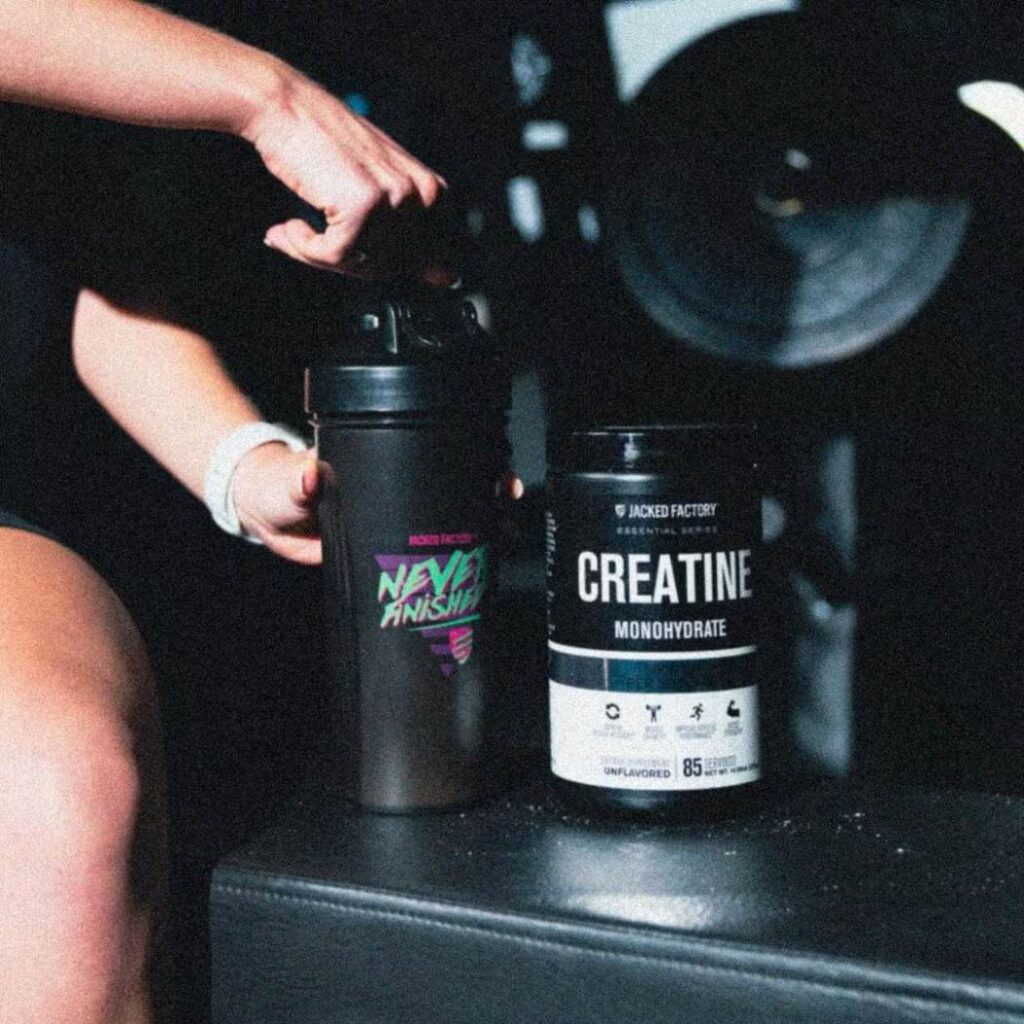
The powder may require some effort to mix into liquids compared to other creatine products. It’s also unflavored, but this allows you to customize your own muscle-building supplement stack by mixing it with pre-workout or other supplements!
This product is meticulously manufactured in a cGMP-certified, FDA-registered facility in the United States, adhering to rigorous quality control standards. This level of commitment to purity and potency sets it apart from many other creatine supplements out there.
Overall, Jacked Factory’s Creatine Monohydrate can be a powerful and versatile addition to your workout routine.
Positives:
Could be better:
FAQ
Is Beta-Alanine Same As Creatine?
When talking about creatine or beta alanine, they’re both amino acids that are produced by your body naturally. However, they are different from each other in the sense that beta alanine is a single amino acid, whereas creatine is synthesized from 3 different amino acids; glycine, methionine, and arginine.
Other than their molecular structure, both these compounds serve different chemistrical/biological purposes in the human body.
Should I Take Both Creatine And Beta-Alanine?
A lot of people wonder; can you take beta alanine and creatine together? And the short answer is yes! When combining these two supplements you can enhance and optimize your athletic performance.
Important Note: Do make sure to take into account the dosage of the supplements and consult with your healthcare professional first.
Does Beta-Alanine Help Build Muscle?
Even though beta alanine allows the person to perform workouts harder and for a longer time, it in itself does not do anything to help build muscle mass. It may indirectly and slightly lead to better muscle growth due to more workout volume and your recovery, but the gains are not very significant.
There are other studies that show that taking beta alanine alone leads to no muscle mass gained over a period of time of resistance training.
Conclusion
So, beta alanine or creatine, now you know the difference between the two and how they perform in separate athletic scenarios. This allows you to make an informed decision on which supplement to use and when.
With beta alanine, you get an amino acid that can take you the extra miles (or rounds!) by reducing muscle fatigue. Transparent Labs’ Raw Series Beta Alanine does this by minimizing the buildup of hydrogen ions, delaying the tiring out of muscles so you can perform harder for longer periods of time.
Creatine is a natural compound that allows you to fully harness the explosive power of your muscles during short bursts and explosive weight training sessions. Jacked Factory Creatine Monohydrate powder ensures this by increasing the availability of PCr and Adenosine Triphosphate (ATP), so your muscles have ample energy for high intensity activities.
So, what kind of workouts do you do? Do you take these supplements individually or together?
Let us know your thoughts in the comments section below. And if you have any queries regarding these two supplements we have mentioned, please do not hesitate to ask!
Also read:
- Why Does Creatine Taste So Bad
- How Many Days of Creatine Can You Miss
- Is Creatine Bad for Your Stomach
- What Happens if You Take Creatine Without Working Out
- Does Creatine Make You Stronger or Just Bigger
- Whey Protein vs Creatine
- Can You Dry Scoop Creatine
- Does Creatine Increase Testosterone
References:
- Robert Cooper, “Creatine supplementation”, NCBI, https://www.ncbi.nlm.nih.gov/pmc/articles/PMC3407788/
- Konstantinos I. Avgerinos, “Effects of creatine supplementation on cognitive function”, NCBI, https://www.ncbi.nlm.nih.gov/pmc/articles/PMC6093191/
- Darren G Candow, “Heads Up” for Creatine Supplementation”, PubMed, https://pubmed.ncbi.nlm.nih.gov/37368234/
- Eric T. Trexler, “Beta-Alanine”, NCBI, https://www.ncbi.nlm.nih.gov/pmc/articles/PMC4501114/
- Felipe Ribeiro, “Timing of Creatine Supplementation”, NCBI, https://www.ncbi.nlm.nih.gov/pmc/articles/PMC8401986/
- Jay Hoffman, “Effect of creatine and beta-alanine supplementation”, PubMed, https://pubmed.ncbi.nlm.nih.gov/17136944/
- Iain P Kendrick, “The effects of 10 weeks of resistance training combined with beta-alanine supplementation”, PubMed, https://pubmed.ncbi.nlm.nih.gov/18175046/
- Jordan M Glenn, “Effects of 28-Day Beta-Alanine Supplementation on Isokinetic Exercise Performance”, PubMed, https://pubmed.ncbi.nlm.nih.gov/26110349/
Why Trust Us?
With over 20 years in Olympic Weightlifting, our team does its best to provide the audience with ultimate support and meet the needs and requirements of advanced athletes and professional lifters, as well as people who strive to open new opportunities and develop their physical capabilities with us.
By trusting the recommendations of our certified experts in coaching, nutrition, dietology, and sports training programming, as well as scientific consultants, and physiotherapists, we provide you with thorough, well-considered, and scientifically proven content. All the information given in the articles concerning workout programming, separate exercises, and athletic performance, in general, is based on verified data. We ensure that you can rely on our professionals’ pieces of advice and recommendations that can be treated as personalized ones which will benefit you and fully meet your needs.
The product testing process is described in more detail here
Author: Jacek Szymanowski
Certified Nutritionist,
M.Sc.Eng. Biotechnology
Performance Architect,
Strength and Conditioning Specialist
With over 30 years of fighting experience, specialization in nutrition coaching for athletes, and expertise in metabolic health and dietary strategies, Jacek offers a comprehensive approach to optimizing your performance and well-being. Backed by a Master of Science degree in Biotechnology, Jacek remains at the forefront of scientific advancements, ensuring that his coaching is always evidence-based and up-to-date.

